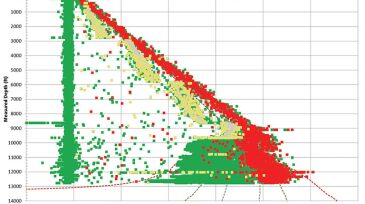history matching
-
This work evaluates and compares the performance of rate normalization and pressure deconvolution for both synthetic and tight-oil examples.
-
The authors describe an approach to achieve reliable estimation of field gas initially in place.
-
This study explores pitfalls experienced when using capacitance/resistance modeling as a plug-and-play technique for waterflood optimization and discusses workarounds and mitigations to improve its reliability.
-
The dynamic nature of unconventional-reservoir developments calls for the availability of fast and reliable history-matching methods for simulation models. In this paper, the authors apply an assisted-history-matching approach to a pair of wells in the Wolfcamp formation.
-
Most history-matching studies have fixed resources—that is, the team of engineers and geoscientists is predetermined. Moreover, the deadlines are always very strict. This constrained scenario often leads to an unfortunate result: The quality of the study suffers.
-
The industry increasingly relies on forecasts from reservoir models for reservoir management and decision making. However, because forecasts from reservoir models carry large uncertainties, calibrating them as soon as data come in is crucial.
-
The results of the authors’ research showed promising benefits from the use of a systematic procedure of model diagnostics, model improvement, and model-error quantification during data assimilations.
-
The complete paper explores the use of multilevel derivative-free optimization for history matching, with model properties described using principal component analysis (PCA) -based parameterization techniques.
-
To enhance the applicability of localization to various history-matching problems, the authors adopt an adaptive localization scheme that exploits the correlations between model variables and observations.
-
A challenging problem of automated history-matching work flows is ensuring that, after applying updates to previous models, the resulting history-matched models remain consistent geologically.










